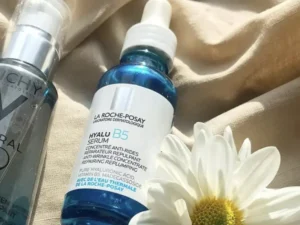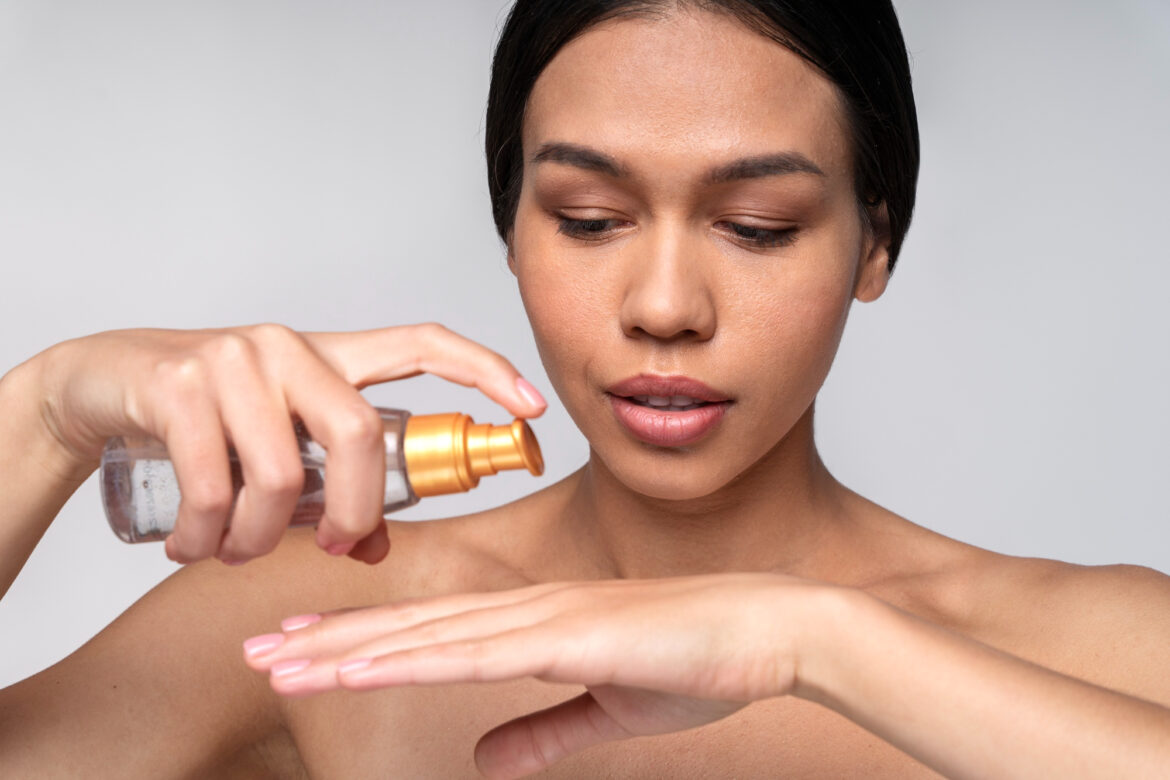Finding the right skincare products can be a challenge, especially if you have sensitive skin. Sensitive skin tends to react easily to certain ingredients, making it prone to redness, irritation, and dryness. One of the most effective ways to address these concerns is by incorporating a serum into your skincare routine. Serums are lightweight, fast-absorbing liquids packed with active ingredients designed to target specific skin issues. In this article, we’ll explore the 10 best serums for sensitive skin that are gentle, effective, and loved by many.
Table of Contents
ToggleWhat Makes a Serum Suitable for Sensitive Skin?
Before diving into the list, it’s important to understand what makes a serum suitable for sensitive skin. Sensitive skin requires products that are gentle, soothing, and free from harsh chemicals or irritants. Look for serums that are:
- Fragrance-Free: Fragrances can irritate sensitive skin, so it’s best to choose fragrance-free products.
- Hypoallergenic: These products are less likely to cause allergic reactions.
- Non-Comedogenic: This means the serum won’t clog your pores, which is important for avoiding breakouts.
- Dermatologist-Tested: Products tested by dermatologists are generally safer for sensitive skin.
10 Best Serums For Sensitive Skin
Following 10 serums are considered to be the best for sensitive skin:
1. La Roche-Posay Hyalu B5 Serum
La Roche-Posay is a brand well-known for its gentle, effective skincare products. The Hyalu B5 Serum is a hydrating serum that helps to plump the skin, reduce wrinkles, and improve skin texture. It contains two types of hyaluronic acid to deeply hydrate and vitamin B5 to soothe and repair the skin.

Why It’s Great for Sensitive Skin:
- Fragrance-Free: No added fragrances that could irritate your skin.
- Dermatologist-Tested: Tested on sensitive skin to ensure safety and effectiveness.
- Soothing: The inclusion of vitamin B5 helps to calm irritated skin.
More Information: La Roche-Posay Hyalu B5 Serum
2. Vichy Mineral 89 Hyaluronic Acid Hydration Booster
Vichy’s Mineral 89 Serum is a popular choice for those with sensitive skin. This serum is formulated with 89% Vichy Volcanic Water and natural-origin hyaluronic acid to strengthen the skin’s barrier, hydrate, and plump the skin.
Why It’s Great for Sensitive Skin:
- Simple Ingredients: Contains only 11 ingredients, making it less likely to irritate the skin.
- Fragrance-Free: Suitable for even the most sensitive skin types.
- Hydrating: Provides intense hydration, which is essential for maintaining a healthy skin barrier.
More Information: Vichy Mineral 89 Serum
3. Avene Hydrance Intense Rehydrating Serum
Avene is another brand recognized for its gentle approach to skincare, particularly for sensitive skin. The Hydrance Intense Rehydrating Serum is designed to provide long-lasting hydration and soothe the skin. It contains Avene’s signature thermal spring water, known for its calming properties.

Why It’s Great for Sensitive Skin:
- Soothing: Infused with Avene thermal spring water to calm and comfort the skin.
- Lightweight: Absorbs quickly without leaving a greasy residue.
- Hypoallergenic: Formulated to minimize the risk of allergic reactions.
More Information: Avene Hydrance Intense Rehydrating Serum
4. CeraVe Hydrating Hyaluronic Acid Serum
CeraVe is a brand known for its simple yet effective skincare products. Their Hydrating Hyaluronic Acid Serum is no exception. It provides long-lasting hydration and helps to restore the skin’s natural barrier with essential ceramides.
Why It’s Great for Sensitive Skin:
- Fragrance-Free: No fragrances that could irritate sensitive skin.
- Ceramide-Rich: Helps to restore and maintain the skin’s protective barrier.
- Non-Greasy: Lightweight formula that absorbs quickly.
More Information: CeraVe Hydrating Hyaluronic Acid Serum
5. The Ordinary Niacinamide 10% + Zinc 1%
The Ordinary has become a cult favorite for offering high-quality skincare products at affordable prices. Their Niacinamide 10% + Zinc 1% serum is designed to reduce the appearance of blemishes, brighten skin tone, and improve skin texture. While niacinamide is generally well-tolerated, it’s important to introduce it slowly into your routine if you have sensitive skin.
Why It’s Great for Sensitive Skin:
- Alcohol-Free: No drying alcohols that can irritate the skin.
- Simple Formula: Minimal ingredients reduce the risk of irritation.
- Balancing: Helps to control oil production and improve skin texture.
More Information: The Ordinary Niacinamide 10% + Zinc 1%
6. Bioderma Hydrabio Serum
Bioderma’s Hydrabio Serum is designed to provide intense hydration while improving the skin’s ability to retain moisture. It’s particularly beneficial for sensitive and dehydrated skin.
Why It’s Great for Sensitive Skin:
- Fragrance-Free: Gentle on sensitive skin.
- Aquagenium Technology: Improves the skin’s moisture retention.
- Lightweight: Absorbs quickly and leaves the skin feeling refreshed.
More Information: Bioderma Hydrabio Serum
7. First Aid Beauty Ultra Repair Hydrating Serum
First Aid Beauty is a brand that’s all about delivering products that are safe for sensitive skin. The Ultra Repair Hydrating Serum is no different, offering deep hydration and soothing benefits with ingredients like hyaluronic acid, colloidal oatmeal, and aloe.
Why It’s Great for Sensitive Skin:
- Fragrance-Free: No added fragrances or harsh chemicals.
- Soothing: Colloidal oatmeal and aloe calm irritated skin.
- Dermatologist-Tested: Suitable for sensitive skin and those prone to eczema.
More Information: First Aid Beauty Ultra Repair Hydrating Serum
8. Neutrogena Hydro Boost Hydrating Serum
Neutrogena’s Hydro Boost line is well-loved for its ability to provide intense hydration. The Hydro Boost Hydrating Serum is lightweight, non-greasy, and packed with hyaluronic acid to keep your skin plump and moisturized.
Why It’s Great for Sensitive Skin:
- Oil-Free: Won’t clog pores or cause breakouts.
- Fragrance-Free: Safe for sensitive skin types.
- Hydrating: Delivers a burst of hydration that lasts all day.
More Information: Neutrogena Hydro Boost Hydrating Serum
9. Paula’s Choice Calm Repairing Serum
Paula’s Choice is known for its science-backed skincare products. The Calm Repairing Serum is formulated specifically for sensitive skin, helping to reduce redness, calm irritation, and strengthen the skin’s barrier.
Why It’s Great for Sensitive Skin:
- Soothing Ingredients: Includes antioxidants and anti-inflammatory agents to calm the skin.
- Fragrance-Free: Free from fragrances and harsh irritants.
- Lightweight: Easy to layer under other skincare products or makeup.
More Information: Paula’s Choice Calm Repairing Serum
10. Drunk Elephant B-Hydra Intensive Hydration Serum
Drunk Elephant’s B-Hydra Intensive Hydration Serum is designed to deliver continuous hydration throughout the day. It’s a lightweight gel that helps to improve the appearance of skin tone and texture while providing deep hydration.
Why It’s Great for Sensitive Skin:
- Fragrance-Free: No synthetic fragrances or dyes.
- Nourishing: Contains provitamin B5 to help attract and hold moisture.
- Silicone-Free: Free from silicones, which can clog pores and irritate the skin.
More Information: Drunk Elephant B-Hydra Intensive Hydration Serum
How to Choose the Right Serum for Sensitive Skin
Choosing the right serum for your sensitive skin involves more than just picking a product from the shelf. Here are some tips to help you make the best choice:
1. Patch Test First
Before applying any new serum to your face, it’s important to do a patch test. Apply a small amount of the serum to an area of your skin (such as your wrist or behind your ear) and wait 24-48 hours to see if there’s any reaction.
2. Start Slowly
If you have sensitive skin, it’s best to introduce new products slowly into your routine. Start by using the serum every other day or even less frequently, then gradually increase usage as your skin adapts to the product. This helps minimize the risk of irritation and allows your skin to adjust to the active ingredients in the serum.
3. Look for Hydrating Ingredients
Sensitive skin often benefits from hydration, as it helps to soothe and repair the skin barrier. Ingredients like hyaluronic acid, glycerin, and aloe vera are excellent for providing moisture without causing irritation. These ingredients help keep your skin plump, soft, and more resilient to external factors.
4. Avoid Known Irritants
When selecting a serum, check the ingredient list for known irritants, especially if you have sensitive skin. Common irritants include alcohol, artificial fragrances, sulfates, and harsh preservatives. Opt for products labeled as fragrance-free, alcohol-free, and hypoallergenic to reduce the risk of adverse reactions.
5. Consider Your Skin’s Specific Needs
Sensitive skin can vary from person to person. Some individuals may have dryness, while others might experience redness or occasional breakouts. Choose a serum that addresses your specific skin concerns. For example, if redness is an issue, look for calming ingredients like niacinamide or chamomile. If you’re dealing with dryness, focus on serums that provide deep hydration.
6. Consult a Dermatologist
If you’re unsure about which serum is right for your sensitive skin, or if you’ve had reactions to skincare products in the past, consider consulting a dermatologist. They can recommend products that are suitable for your skin type and help you create a skincare routine tailored to your needs.
Additional Tips for Caring for Sensitive Skin
Beyond choosing the right serum, there are other steps you can take to care for your sensitive skin. Here are some additional tips:
1. Keep Your Routine Simple
When it comes to sensitive skin, less is often more. Stick to a simple skincare routine that includes a gentle cleanser, a suitable serum, and a moisturizer. Avoid overloading your skin with too many products, as this can lead to irritation.
2. Use Lukewarm Water
Hot water can strip your skin of its natural oils, leading to dryness and irritation. When washing your face or showering, use lukewarm water instead. This helps to maintain your skin’s moisture balance and reduces the risk of irritation.
3. Moisturize Regularly
Moisturizing is crucial for maintaining a healthy skin barrier, especially for those with sensitive skin. Choose a fragrance-free, hypoallergenic moisturizer that locks in hydration and protects your skin from environmental stressors.
4. Protect Your Skin from the Sun
Sensitive skin is often more prone to sun damage, so it’s important to protect it with a broad-spectrum sunscreen that has an SPF of 30 or higher. Look for sunscreens that are specifically formulated for sensitive skin, and reapply every two hours when you’re outdoors.
More Information: For more on choosing the right sunscreen, check out The Skin Cancer Foundation’s sunscreen guide.
5. Be Gentle When Applying Products
When applying skincare products, be gentle. Use your fingertips to apply serums and moisturizers, and avoid rubbing or tugging at your skin. Patting products into your skin can help them absorb better and reduces the risk of irritation.
6. Watch for Changes in Your Skin
Sensitive skin can be unpredictable, so it’s important to monitor how your skin responds to new products. If you notice any signs of irritation, such as redness, itching, or burning, discontinue use and consult a dermatologist if necessary.
Conclusion
Finding the right serum for sensitive skin can make a significant difference in how your skin looks and feels. The 10 serums listed in this article are all excellent choices for those with sensitive skin, offering hydration, soothing properties, and protection without causing irritation. Whether you’re looking to calm redness, boost hydration, or improve your skin’s texture, there’s a serum on this list that can help.
Remember, the key to caring for sensitive skin is to keep your routine simple, avoid known irritants, and introduce new products slowly. By doing so, you can enjoy the benefits of a well-chosen serum without the worry of irritation.
For more information on skincare for sensitive skin, check out these helpful links:
With the right approach and products, you can achieve healthy, glowing skin, even if it’s sensitive. Happy skincare shopping!
FAQ: 10 Best Serums for Sensitive Skin
1. What should I look for in a serum if I have sensitive skin?
When choosing a serum for sensitive skin, look for products that are free from fragrances, alcohol, sulfates, and parabens, as these ingredients can cause irritation. Opt for serums labeled as hypoallergenic and non-comedogenic to reduce the risk of allergic reactions and clogged pores. Ingredients like hyaluronic acid, niacinamide, and aloe vera are excellent for providing hydration and soothing the skin without triggering sensitivity. It’s also beneficial to choose products that are dermatologist-tested and specifically formulated for sensitive skin.
2. Can I use serums every day if I have sensitive skin?
Yes, you can use serums daily if you have sensitive skin, but it’s important to start slowly. Begin by applying the serum every other day or a few times a week to allow your skin to adjust. If your skin responds well, you can gradually increase usage to daily application. Pay close attention to how your skin reacts, and discontinue use if you notice any signs of irritation such as redness, burning, or increased sensitivity.
3. How do I apply serum to avoid irritating my sensitive skin?
To apply serum without irritating your sensitive skin, first, ensure your skin is clean and slightly damp, as damp skin can help absorb the serum better. Use a small amount of serum (usually 2-3 drops) and gently pat it into your skin with your fingertips. Avoid rubbing or massaging the serum into your skin too vigorously, as this can cause irritation. Allow the serum to absorb fully before applying your moisturizer or any other skincare products.
4. What ingredients should I avoid in serums if I have sensitive skin?
If you have sensitive skin, it’s best to avoid serums that contain alcohol, synthetic fragrances, parabens, sulfates, and harsh exfoliants like AHAs or BHAs in high concentrations. These ingredients can strip the skin of its natural oils, leading to irritation, redness, and dryness. Additionally, avoid serums with high levels of retinoids or vitamin C (in acidic forms) unless they are specifically formulated for sensitive skin, as these can be too strong and cause irritation.
5. Can I combine different serums if I have sensitive skin?
While it is possible to layer serums, those with sensitive skin should do so with caution. Combining multiple serums with active ingredients can increase the risk of irritation. It’s best to start by introducing one serum at a time and observe how your skin reacts before adding another. If you choose to layer serums, ensure that they contain compatible ingredients and are formulated to be gentle on sensitive skin. It’s also helpful to apply the most lightweight serum first, followed by thicker formulas.
6. How long does it take to see results from a serum on sensitive skin?
The time it takes to see results from a serum can vary depending on the specific product and your skin’s condition. Generally, you may start noticing improvements in hydration and texture within a few days to a week. For more significant results, such as reduced redness or improved skin tone, it may take 4-6 weeks of consistent use. Remember, with sensitive skin, patience is key. Consistent, gentle use will yield better results over time without causing irritation.
7. What are the best hydrating ingredients in serums for sensitive skin?
Hyaluronic acid, glycerin, and aloe vera are some of the best hydrating ingredients for sensitive skin. Hyaluronic acid is a powerful humectant that attracts moisture to the skin, keeping it plump and hydrated. Glycerin also helps to draw moisture into the skin and improves its barrier function. Aloe vera is known for its soothing and hydrating properties, making it ideal for calming sensitive skin. These ingredients help maintain moisture levels without clogging pores or causing irritation.
8. Can I use a serum if I have other skin concerns, such as acne or rosacea, along with sensitive skin?
Yes, you can use a serum even if you have other skin concerns like acne or rosacea, but it’s important to choose a serum specifically formulated for sensitive skin with these conditions in mind. Look for serums that contain soothing ingredients like niacinamide, which can help reduce inflammation and redness associated with acne and rosacea. Avoid serums with high concentrations of harsh exfoliants or alcohol, as these can exacerbate your skin issues. Consulting with a dermatologist can also help you find the right serum for your specific skin concerns.
9. How do I store serums to maintain their effectiveness for sensitive skin?
To maintain the effectiveness of your serums, especially for sensitive skin, store them in a cool, dry place away from direct sunlight. Some serums, particularly those containing vitamin C or other antioxidants, are sensitive to light and air, so it’s best to keep them in their original packaging, preferably in a dark or opaque bottle. Avoid storing serums in the bathroom, as the humidity can degrade their effectiveness. If you notice any changes in color, smell, or texture, it’s best to discard the product as it may no longer be effective.
10. Should I follow up with a moisturizer after applying a serum if I have sensitive skin?
Yes, it’s important to follow up with a moisturizer after applying a serum, especially if you have sensitive skin. Serums are designed to deliver active ingredients deep into the skin, but they don’t typically provide enough moisture on their own. A moisturizer helps to lock in the serum’s benefits, provide additional hydration, and protect the skin’s barrier. Choose a gentle, fragrance-free moisturizer that complements your serum and suits your skin type to maximize the benefits of both products.
